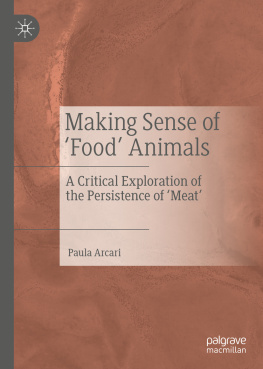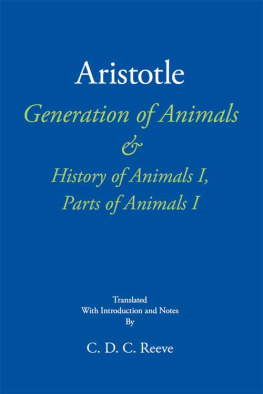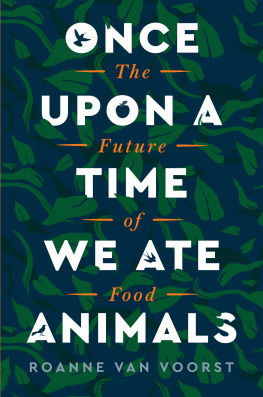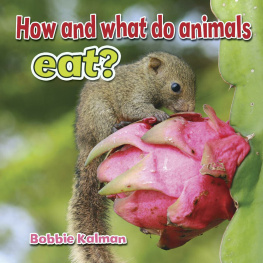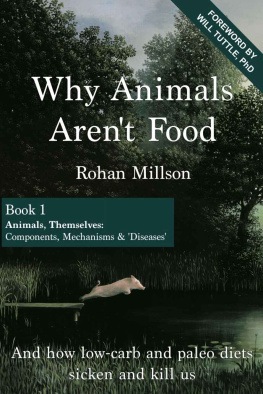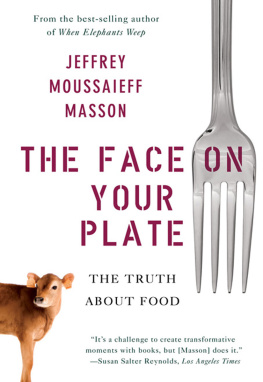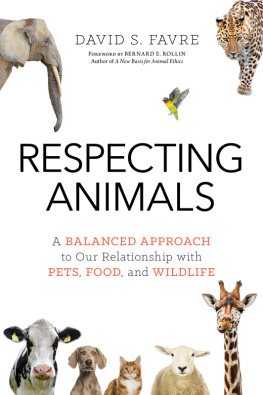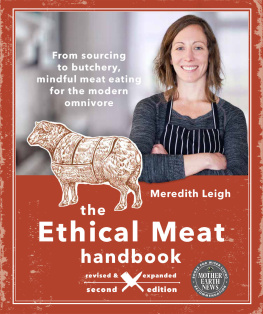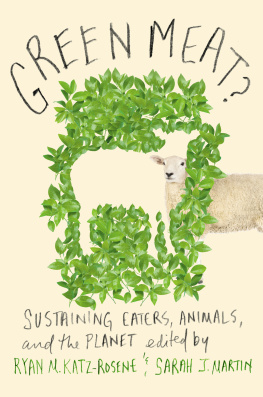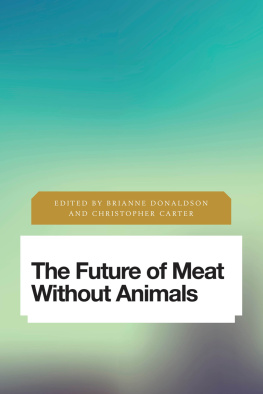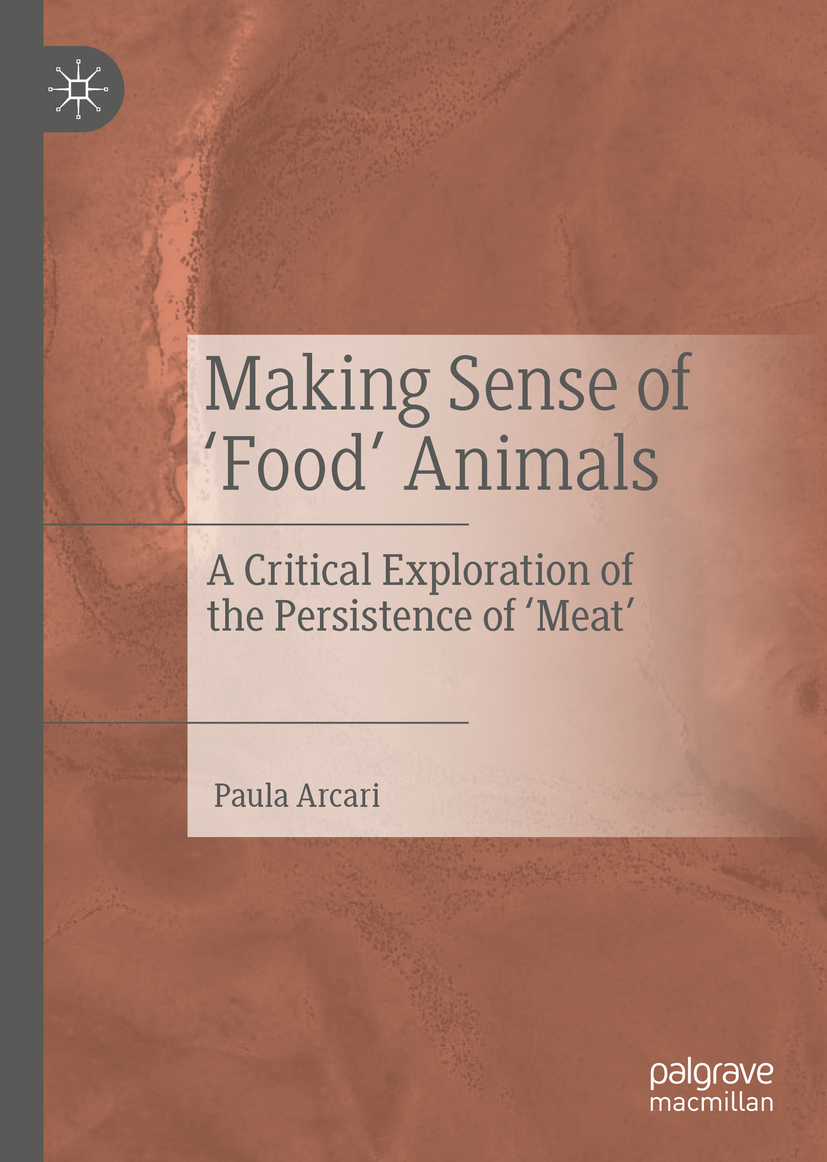Paula Arcari
Making Sense of Food Animals
A Critical Exploration of the Persistence of Meat
Paula Arcari
Department of Social Sciences Centre for Human Animal Studies (CfHAS), Edge Hill University, Ormskirk, UK
ISBN 978-981-13-9584-0 e-ISBN 978-981-13-9585-7
https://doi.org/10.1007/978-981-13-9585-7
The Editor(s) (if applicable) and The Author(s), under exclusive license to Springer Nature Singapore Pte Ltd. 2020
This work is subject to copyright. All rights are solely and exclusively licensed by the Publisher, whether the whole or part of the material is concerned, specifically the rights of translation, reprinting, reuse of illustrations, recitation, broadcasting, reproduction on microfilms or in any other physical way, and transmission or information storage and retrieval, electronic adaptation, computer software, or by similar or dissimilar methodology now known or hereafter developed.
The use of general descriptive names, registered names, trademarks, service marks, etc. in this publication does not imply, even in the absence of a specific statement, that such names are exempt from the relevant protective laws and regulations and therefore free for general use.
The publisher, the authors and the editors are safe to assume that the advice and information in this book are believed to be true and accurate at the date of publication. Neither the publisher nor the authors or the editors give a warranty, express or implied, with respect to the material contained herein or for any errors or omissions that may have been made. The publisher remains neutral with regard to jurisdictional claims in published maps and institutional affiliations.
This Palgrave Macmillan imprint is published by the registered company Springer Nature Singapore Pte Ltd.
The registered company address is: 152 Beach Road, #21-01/04 Gateway East, Singapore 189721, Singapore
This is a fascinating and important work that stretches the field of critical animal studies in new ways, takes existing scholarship forward in its synthesis of ideas within Foucauldian approaches to studying humans and animals. Original interviews with consumers and producers are handled with exemplary ethical standards by Dr Arcari, making this a timely book for students and scholars to support their own explorations of the ways in which humans currently treat animals within food production systems.
Alex Lockwood, The University of Sunderland, UK
This is an excellent book which is beautifully written and genuinely a pleasure to read. Paula Arcari presents us with a highly original and significant contribution to a number of fields: sociological understandings of food and eating practices, thinking about food animals in sociological and cultural animal studies, and ultimately, the persistence of meaty practices despite public concern and welfarist moves. It is an important contribution to Foucauldian scholarship and stretches Foucauldian insights in innovative ways for critical posthumanist theory.
Erika Calvo, University of East London, UK
Making Sense of Food Animals is the first systematic investigation of its kind a rigorous, substantial, original and significant contribution to knowledge, with implications for how we understand discourses surrounding animal-based food consumption, and the role of narratives of self in relation to social change. This wonderfully clear and accessible book is a valuable tool for understanding the kinds of knowledge constructions which support continued animal product consumption, despite the mounting ethical, health and environmental evidence which suggests that this consumption is pernicious and not sustainable.
Dinesh Wadiwel, University of Sydney, Australia
Preface
I want to begin by openly owning the assumptions and values I bring to this research and declaring it to be an attempt at a moral science, a critical enquiry into the everyday conditions of domination for the purposes of altering them (Seidman 1998: 329). With this declaration, I am acknowledging that my theoretical and methodological choices are themselves rhetoricencoding certain assumptions and values about the social world (Agger 1991: 114). Accounting for myself in this way, making explicit my a priori knowledge, beliefs, and biases, is an attempt at reflexive research as described by Cutcliffe (2003). This reflexivity is not a post-analysis addition to the book, but was part of the entire research process, as will become apparent. Hence, while included here as a point of reference for the reader, a constant awareness of my own personal and contextual orientation has informed every phase of this research, allowing me to ponder the ways in which who [I am] may both assist and hinder the process of co-constructing meanings (Berger 2014: 221).
Meat does not occupy a prominent position in my personal foodscape. I am vegan for all the reasons associated with veganism as an intersectional and therefore necessarily political movement and not simply a diet. These reasons include the materialisation of animal bodies, the aggregation and de-personalisation of living beings, the othering and oppression of animals based on species, their use as a human resource, the intersection of issues of race and gender in our (mis-)use of animals, and many others (Adams 2010 [1990]; Cudworth 2011; Fiddes 1991; Harper 2011; Nibert 2013). My position is best summed up by the main character in Emma Geens 2016 novel, The Many Selves of Katherine North , who observes, other subjectivities arent a consumer item. Their habitats arent playgrounds (190).
I do not consider meat to be an essential or even necessary part of the human diet. Whole cultures have existed for generations without it. However, many, and indeed the majority of people, do consider it both essential and necessary. Putting aside arguments relating to the (un)availability of alternatives, which pertain to broader mechanisms of distribution and access rather than necessity, my personal view is that a plant-based diet is a viable proposition for the global population. Given the breadth of scholarly work covering animal rights, critical animal studies, veganism, and notions of the next (nonhuman) social contract (Gabardi 2017), literary explorations that challenge the edibility of nonhuman animals (e.g. Vint 2010; Atwood 1998, 2004), and filmic endeavours that draw attention to our current treatment of animals (e.g. Noah 2014; Okja 2017; Carnage 2017), I am certainly not isolated in this view.
A critical approach to animal studies is gaining traction across multiple social science and humanities disciplines including history, geography, anthropology, literature, the creative arts, cultural studies, sociology, development studies, political science, law, criminology, environmental sciences, and many more. These approaches, and the thinking they reflect, antecede the non-, post- and more-than-human turns across the social sciences, which broadly (cl)aim to decentre humans and also, in some cases, to fundamentally reshape human relations with living nonhuman others. They also go further in their de-centring by extending it across all domains of social life, challenging the most spurious conceptions of human-animal entanglements, including, but not limited to, those where animals are used for food, entertainment, education, sport, service, research, and fashion. Such human-animal relations are characterised, above all, by commodity and exchange values that are fundamentally human-centric.

